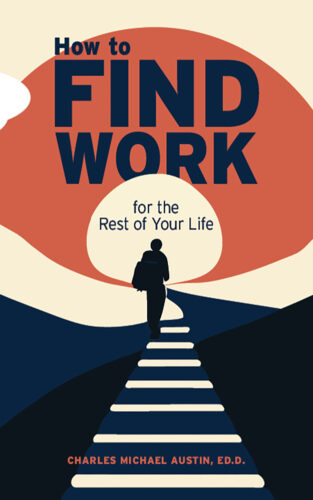Dr. Chaz Austin, Ed.D. has worked as a career trainer for clients all over the world for the past 20 years. He has been a guest on over 25 podcasts in the past year, has over 35,000 followers on LinkedIn, and wrote and teaches a series of three courses for LinkedIn Learning:
- CREATING A CAREER PLAN https://goo.gl/IFMDCj
- SUCCEEDING IN A NEW JOB https://goo.gl/lYxRSH
- TRANSITIONING OUT OF YOUR JOB https://goo.gl/YtWBkr
The courses have been viewed by hundreds of thousands of people, and each one has a rating of 4.7 (out of 5.0) based on over 3700 reviews.
He is also a TEDx speaker who said, “When I work with my clients, we always start at the end: what’s your goal? And my personal goal is to find a university willing to do a pilot study of my program, which involves training college students on the business side, in how market themselves and monetize their education. It consists of a MANDATORY series of courses, beginning freshman year, that’s embedded into a traditional college curriculum. I know from experience that my program works. And then, my LONG TERM GOAL is to have it adopted by every college and university in the United States.”
Dr. Austin has presented papers to: the National Association of Women MBAs, the Association for Business Communication, the National Council for Workforce Education, the Society of Educators and Scholars, the International College Teaching and Learning Conference, and the Global Conference on Leadership and Management, among others.
He holds a Doctorate in Organizational Leadership from Pepperdine University, and has been a college professor for over 20 years.
Dr. Austin has authored three books on self-marketing, treating yourself like a business and behaving like an entrepreneur. His latest book, from which the following is excerpted, is “How To Find Work for the Rest of Your Life,” and can be purchased on Amazon

Determine the Value of a Degree
In the 20th century, a degree was the primary, default marketing tool needed to find work. In what’s become a freelance workplace in the 21st century, degrees are sometimes necessary, but are now insufficient. A degree guarantees nothing, but in some fields, you need to have one to get to the starting line. If they work or want to work in an industry where a degree is useful, my students and clients often ask me whether they should pursue yet an- other degree. Usually my answer is yes. In certain fields (like education), the more degrees you have, the more options you have. But if you’re on a career track where degrees are useful and/or required, you’ll need to choose whether that particular degree is worth the time and money you’ll invest to earn it. And unfortunately, there may not be a direct correlation between your investment and the results.
When you buy a car, you know what you’re getting. You can choose the options you want and know ahead of time what it will feel like to drive it and how it will perform. The results of an education are more indirect. I paid approximately $70,000 for my doctorate. I can’t actually measure the return on that investment, however, because it’s indirect. Was it worth it?
Absolutely. Can I tell you the specific results? Not exactly. I can say that since earning my doctorate, I have more intellectual rigor, am paid better for my work, and have enjoyed teaching and publishing opportunities that I would not have had without it. Have those new opportunities paid back the $70,000? Yes. But – those opportunities were only partially a result of my becoming DOCTOR Austin. The relationships I’ve developed, the experiences I’ve gained, and the accomplishments I’ve achieved during the many years before I earned my doctorate, how I leveraged them, and my ability to market myself have all contributed— and continue to contribute—to my success. I can’t tell someone who is thinking of getting a law degree—and with it, a debt load of perhaps $100,000—whether it’s going to be “worth it.” What I can advise is that before you enroll in a degree program, you should decide if this degree will help you to manifest your passion in the world. In other words, don’t get a law degree just because you can make more money if you have one. Don’t have it be a default step because you’ve hit a wall in your career of choice (say, acting) and you’ve heard and/or read that lawyers make a lot of money, even though you’re not particularly interested in the law. Instead, do your research. Talk to people who already work in the field and find out from them whether they think it would be worth your time and money. If you’re just graduating college and don’t want or are afraid to get into the workforce, don’t get a master’s degree just because you don’t know exactly what you want to do. Instead, get to work. Find some kind of a job and give it a few years. You may find that you didn’t need an M.B.A. after all. You might discover that you like working in art restoration, so the degree you need is an M.F.A. Or maybe you’ll learn that you didn’t need a degree at all.
And if you’re graduating high school and want to be an auto mechanic, getting a bachelor’s degree doesn’t make a lot of sense. Repair shops hiring mechanics don’t value them. What you’ll want to pursue is your ASE certification. If you’re a carpenter, you’re guided by the mantra, “measure twice, cut once.” You can use this idea whenever you consider furthering your education. Research as thoroughly as possible before you commit your time or money to a certificate/degree/license, so you can determine if it will provide a reasonable return on your investment.
“How To Find Work for the Rest of Your Life,” and can be purchased here: https://shorturl.at/XXWMY
Subscribe to edCircuit to stay up to date on all of our shows, podcasts, news, and thought leadership articles.






